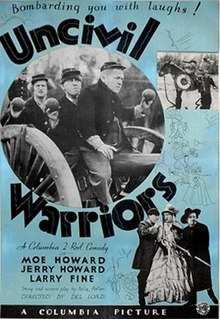Plot
Amidst the tumult of the American Civil War, a strategic imperative is established as a Union General deploys Larry, Moe, and Curly — designated as Operators 12, 14, and 15 respectively — to undertake a clandestine mission behind enemy lines. Tasked with securing vital intelligence, the trio assumes the guise of Southern officers, adopting the aliases Lieutenant Duck, Captain Dodge, and Major Hyde, respectively. Their infiltration of the mansion belonging to Confederate officer Colonel Butts marks the commencement of a series of misadventures.
Against the backdrop of preparations for a dinner party, Curly's amorous inclinations towards Colonel Butts' daughter, Judith Butts, precipitates a whimsical episode as he inadvertently mistakes a quilted potholder for a culinary confection, resulting in a farcical sequence punctuated by fits of feather-induced coughing. The narrative crescendos with Larry and Curly donning elaborate disguises as Captain Dodge's father and wife. Major "Bloodhound" Filbert's inquiry about Captain Dodge's purported offspring prompts Moe to produce a swaddled infant from the nearby railroad station, whose unexpected racial identity unveils the Stooges' subterfuge.
As the ruse unravels, the trio's desperate bid for escape culminates in a frenetic pursuit, culminating in their improbable refuge within a concealed cannon disguised as a log. The ensuing chaos finds the Union General incredulously pondering the whereabouts of the elusive spies, only to be startled by the Stooges' unanticipated descent from the sky.
Production notes
Uncivil Warriors was filmed on March 13–18, 1935. [2] It is the first short in which the Stooges mention "Good Time Charlie". When the Stooges meet a guard, they often reference Charlie. The guard asks who Charlie is, and a Stooge replies that "everybody knows Charlie. He walks like this." The Stooges then demonstrate a silly walk until they get clear of the guard, at which point they take off running. This is a recurring joke in the Stooge shorts. In Uncivil Warriors, they actually meet a soldier named Charlie, who asks the Stooges, "Are you all looking for me?" [3]
The potholder gag would later appear in the Shemp-era short Three Hams on Rye during a live theatrical production. [3] A similar sequence also appears in the 1947 short All Gummed Up , also featuring Shemp. The scene is nearly identical, with bubblegum being used in the place of a potholder, the stooges coughing up bubbles rather than feathers as a result.
When Moe brings the black baby into the Colonel's office he attempts to explain how the baby got his dark complexion ("We had him down the beach all summer...he got quite sunburned!"); this is sometimes deleted for U.S. television broadcasts. [3]
The introductory music over the titles is a medley of "Battle Hymn of the Republic" (most popular marching song of the Union Army) and "Dixie" (which had the same status in the Confederate Army). [3]
This page is based on this
Wikipedia article Text is available under the
CC BY-SA 4.0 license; additional terms may apply.
Images, videos and audio are available under their respective licenses.
